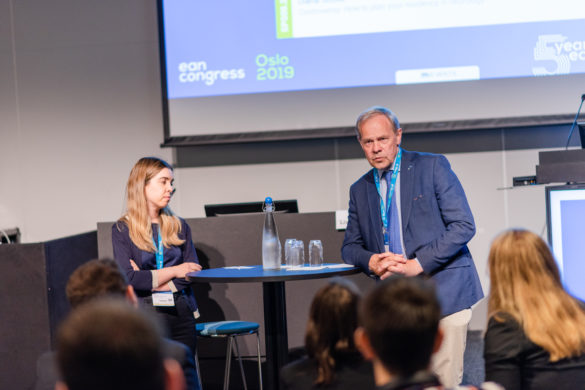
1. Dear Prof. Girault, thank you for accepting this interview. It is my pleasure congratulating you with your appointment as President of FENS. Can you please introduce the EAN Pages readers to FENS and its structure?
Thank you, I started my term as President of FENS in July 2020. With a mission to promote and advance research and education in neuroscience within and outside Europe, the Federation of European Neuroscience Societies, FENS, facilitates interaction and coordination between our members and the broader research community within and beyond Europe.
As an international organisation, federating over 20,000 neuroscientists across 33 European countries, FENS works alone and through partnerships such as with the members of the European Brain Council to promote all aspects of neuroscience, through education, outreach and scientific exchange.
2. The importance of neuroscience research cannot be understated and is key to the work of the clinical neurologists that EAN represents and the better treatment of patients living with a neurological disorder. How would you see an improvement in the cooperation between both societies?
Indeed, the value of investing in neuroscience research is too often underestimated. One of FENS’ challenges is to demonstrate the importance of supporting and investing knowledge-generating research and how it fuels new innovation through translational and applied research. A stronger cooperation between FENS and EAN could in this context help bridge the gap between basic neuroscience and clinically oriented research. Of course there are already many interactions at all levels but I am convinced that cooperation between our societies can further facilitate exchanges between our societies for the benefit of patients and scientific progress.
3. Education stands at the forefront of FENS’ aims and goals. Can you give an overview of the main educational programmes FENS runs?
Higher education offered by FENS includes high-level schools, advanced training courses, webinars and online education, as well as programmes for student exchange and short visits.
FENS Schools are run within an intimate setting by leading scientists around novel concepts in neuroscience: they allow informal interaction between students and faculty, and provide participants with a broad perspective on a dedicated field.
The CAJAL Advanced Neuroscience Training Programme offers a series of three-week hands-on training courses with state-of-the-art technology across disciplines in modern neuroscience. Dedicated to PhD-students and post-docs, the CAJAL courses are project-based and combine lectures by renowned scientists with experimental sessions.
Through the Network of European Neuroscience Schools (NENS), FENS connects over 190 neuroscience graduate school programmes in Europe, providing a platform for interaction and exchange of best practices.
We are also expanding our programme of online educational activities, with an increased focus on educational resources towards early career scientists in addition to the webinars we regularly organise.
FENS has several programmes offering travel grants and stipends to young researchers. These aim to facilitate mobility and scientific exchange, and to provide early career scientists with an opportunity to attend FENS and international partner meetings, training courses and schools.
4. News about the COVID-19 outbreak continues to evolve and represents an unprecedented global health crisis. In order to help neurologists face the crisis, EAN set up the EANcore Covid-19 resource. Did the crisis also affect the work of FENS and how did FENS react to it?
In reaction to the pandemic and the resulting closing of research institutions across Europe, FENS initiated a compilation of online resources: educational materials, online events, platforms and other tools that could help our community cope with the situation in the best way. This was a participative initiative, and the list is available to all on the FENS website. Every year, FENS organises a wide range of meetings and training activities. Most of our activities, including The Brain Conferences, have been either cancelled or postponed until 2021. Our flagship event, the FENS Forum of neuroscience, was however run as an online event in July, the first FENS 2020 Virtual Forum with close to 5.000 attendees meeting and exchanging about neuroscience. As a bonus, we offered extended access to all the Forum programme until 15 October 2020. The Forum featured a rich programme of lectures, symposia, special interest events, poster sessions and we wanted our delegates to take advantage of as much Forum content as they want!










